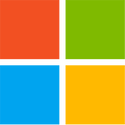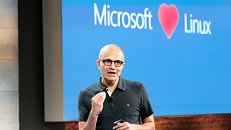Wednesday, November 16th 2016

Microsoft Joins the Linux Foundation
On Wednesday, during its annual Connect(); developer event, Microsoft Corp. unveiled a series of products and partnerships that strengthen the company's Azure cloud platform for building intelligent, cross-platform apps and services. Microsoft Cloud and Enterprise Executive Vice President Scott Guthrie detailed significant steps Microsoft is taking to empower the ecosystem by giving developers greater choice in the tools they use - including joining the Linux Foundation as a Platinum Member to better collaborate with the open source community, welcoming Google to the independent .NET Foundation, and working with Samsung Electronics Co. Ltd. to enable .NET developers to build apps for more than 50 million Samsung devices worldwide.
Guthrie also demonstrated a preview of Visual Studio for Mac, which enables developers to write cloud, mobile and macOS apps on Apple's Mac operating system using the popular development environment; a preview of the next version of the company's flagship SQL Server database with support for Linux, Linux-based Docker containers and Windows-based environments; and a preview of Azure App Service on Linux with support for containers."We want to help developers achieve more and capitalize on the industry's shift toward cloud-first and mobile-first experiences using the tools and platforms of their choice," Guthrie said. "By collaborating with the community to provide open, flexible and intelligent tools and cloud services, we're helping every developer deliver unprecedented levels of innovation."
Collaborating with the community
As part of its effort to work more closely with the open source community, Microsoft on Wednesday announced it has joined the Linux Foundation as a Platinum Member. Microsoft's membership in the Linux Foundation will benefit customers through increased collaboration and innovation among a diverse ecosystem.
"By becoming a Linux Foundation Platinum member, Microsoft is better able to collaborate with the open source community to deliver transformative mobile and cloud experiences to more people," said Jim Zemlin, executive director of The Linux Foundation. "Microsoft has been a key contributor to many projects, and we see the company intensifying its involvement and commitment to open development."
Microsoft has become an active member of the open source community in part through the popularity of its open source and cross-platform application framework .NET Core. Wednesday's addition of Google to the .NET Foundation's Technical Steering Group further reinforces the vibrancy of the .NET developer community as well as Google's commitment to fostering an open platform that supports businesses and developers who have standardized on .NET.
Other industry leaders are also betting on .NET Core for their own commercial products. On Wednesday Samsung is releasing a preview of its Visual Studio Tools for Tizen. Developers can use the tools to build .NET apps for the Tizen operating system that runs on millions of Samsung TVs, wearables, mobile devices and many IoT devices around the world.
Tools for any developer on any platform
Microsoft highlighted several announcements Wednesday aimed at helping developers use the tools of their choice to create Android, iOS and Windows apps powered by Linux or Windows Server, including the following:
Today's most impactful apps are using data to delight users and drive business outcomes. Microsoft today unveiled unique capabilities and services that make it easier for more developers to turn massive amounts of data into deeply personal, intelligent and predictive applications.
Microsoft's solutions evolve with changing developer needs. Through the Visual Studio family, SQL Server, Windows, Office and Azure, Microsoft is working to provide the most complete platform for application innovation, spanning mobile and cloud.
Guthrie also demonstrated a preview of Visual Studio for Mac, which enables developers to write cloud, mobile and macOS apps on Apple's Mac operating system using the popular development environment; a preview of the next version of the company's flagship SQL Server database with support for Linux, Linux-based Docker containers and Windows-based environments; and a preview of Azure App Service on Linux with support for containers."We want to help developers achieve more and capitalize on the industry's shift toward cloud-first and mobile-first experiences using the tools and platforms of their choice," Guthrie said. "By collaborating with the community to provide open, flexible and intelligent tools and cloud services, we're helping every developer deliver unprecedented levels of innovation."
Collaborating with the community
As part of its effort to work more closely with the open source community, Microsoft on Wednesday announced it has joined the Linux Foundation as a Platinum Member. Microsoft's membership in the Linux Foundation will benefit customers through increased collaboration and innovation among a diverse ecosystem.
"By becoming a Linux Foundation Platinum member, Microsoft is better able to collaborate with the open source community to deliver transformative mobile and cloud experiences to more people," said Jim Zemlin, executive director of The Linux Foundation. "Microsoft has been a key contributor to many projects, and we see the company intensifying its involvement and commitment to open development."
Microsoft has become an active member of the open source community in part through the popularity of its open source and cross-platform application framework .NET Core. Wednesday's addition of Google to the .NET Foundation's Technical Steering Group further reinforces the vibrancy of the .NET developer community as well as Google's commitment to fostering an open platform that supports businesses and developers who have standardized on .NET.
Other industry leaders are also betting on .NET Core for their own commercial products. On Wednesday Samsung is releasing a preview of its Visual Studio Tools for Tizen. Developers can use the tools to build .NET apps for the Tizen operating system that runs on millions of Samsung TVs, wearables, mobile devices and many IoT devices around the world.
Tools for any developer on any platform
Microsoft highlighted several announcements Wednesday aimed at helping developers use the tools of their choice to create Android, iOS and Windows apps powered by Linux or Windows Server, including the following:
- The SQL Server on Linux public preview released Wednesday is the first preview of the next version of SQL Server and brings the power of SQL Server to Linux and Linux-based Docker containers, in addition to Windows.
- A new Visual Studio for Mac preview provides a macOS-based integrated development environment designed for building mobile, cloud and macOS apps.
- The availability of Azure App Service on Linux with support for Containers in preview provides native Linux support for Node.js and PHP stacks on Azure App Service and now enables developers to bring their own Docker-formatted container image.
Today's most impactful apps are using data to delight users and drive business outcomes. Microsoft today unveiled unique capabilities and services that make it easier for more developers to turn massive amounts of data into deeply personal, intelligent and predictive applications.
- SQL Server 2016 Service Pack 1 availability makes database innovations accessible to more applications across product editions.
- The availability of Azure Data Lake services, Azure Data Lake Analytics and Data Lake Store means developers and data scientists now have the capabilities required to easily store and process data at petabyte size files, with massively parallel analytics and enterprise-grade security for insights on data of any size, shape and speed.
Microsoft's solutions evolve with changing developer needs. Through the Visual Studio family, SQL Server, Windows, Office and Azure, Microsoft is working to provide the most complete platform for application innovation, spanning mobile and cloud.
- The Visual Studio Mobile Center preview announced Wednesday brings together the cloud and life-cycle services that help developers build, test, distribute and monitor apps built in Objective-C, Swift, Java, Xamarin and React Native for Android-, iOS- and Windows-based devices.
- The Visual Studio 2017 release candidate released Wednesday includes new capabilities to help any developer be more productive than ever for any application and any platform.
- Visual Studio Team Foundation Server 2017 and Azure Application Insights are now available, providing an enhanced collaboration and DevOps platform for cloud- first, mobile-first scenarios.

24 Comments on Microsoft Joins the Linux Foundation
Only thing MS would do if they could with Linux and that be buy all the rights to it. Now Linux going be more unstable if MS get there so AWESOME code in the OS.
They've provided more than Oracle and Google combined.
This is a tad old, but hey... www.theinquirer.net/inquirer/news/2166123/microsoft-contributed-code-canonical-linux-2632
These might not all be Linux specific, but hey, it's only 40 pages so I'm sure you can go through them all in no time... github.com/Microsoft
but well, i still love linux whatever M$'s done
Windows Server is the joke vs Linux.
lwn.net/Articles/654633/
lwn.net/Articles/668870/
lwn.net/Articles/679289/
My simple point is that, as @R-T-B said, there are a lot of servers running a Unix-like OS, we don't have to bastardize the discussion into making this a pissing contest about what constitutes a "real Unix."
and while they share nothing in common in code base, you'd be a fool not to see how they often imitate one another... there are many operational similarities.
There is also the BSD's, which have a unix codebase but do not pay the licensed unix fees...
But whatever, I'm not here to argue just to spread some information...